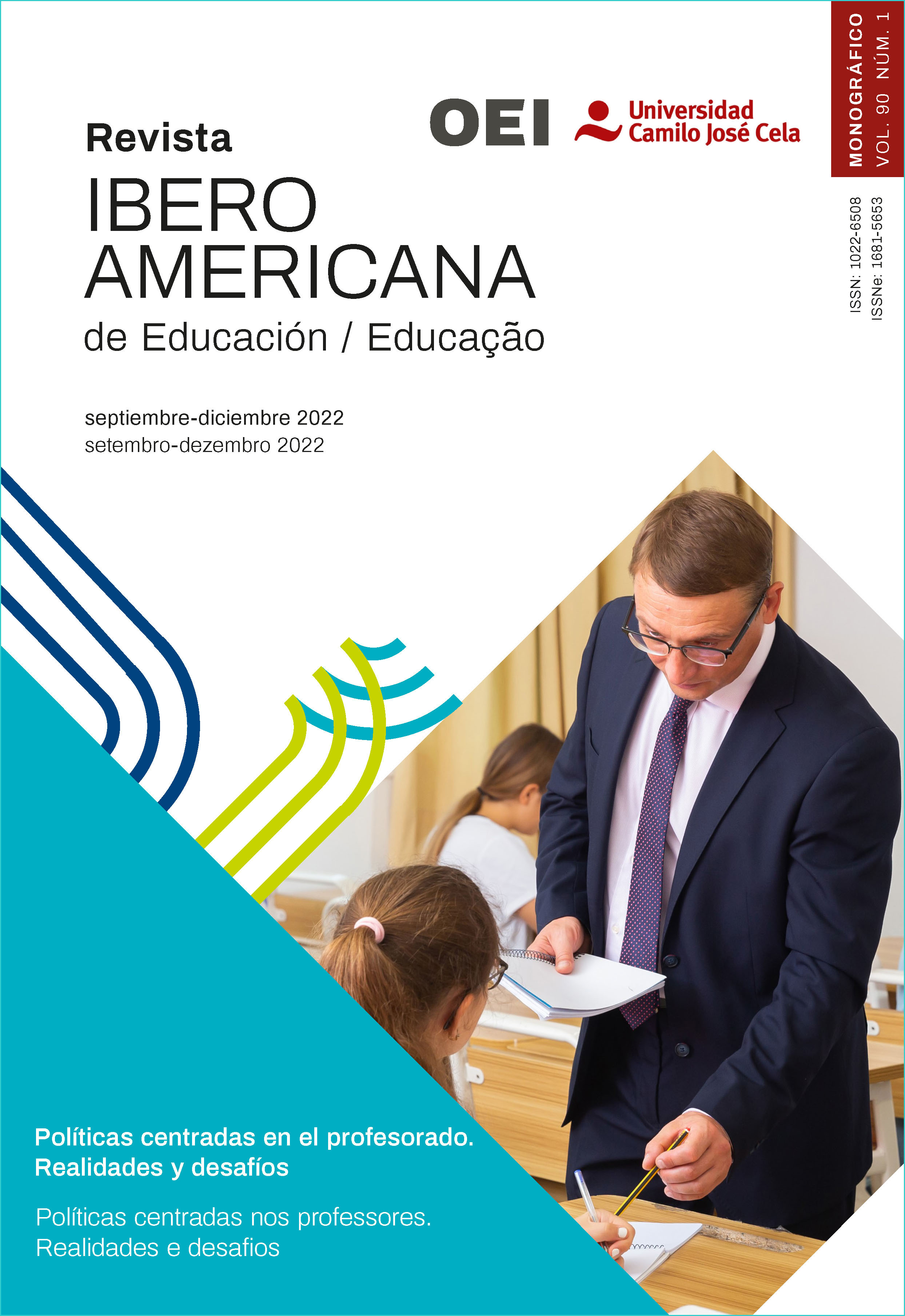Como apoiar e como abandonar os professores na batalha pelo sucesso educativo – A experiência de Portugal entre 1995 e 2020
DOI:
https://doi.org/10.35362/rie9015440Palavras-chave:
políticas educativas; avaliação educativa; curriculum; formação de professores; história da educação. PISA; TIMSSResumo
Entre os anos finais do século XX e as duas primeiras décadas do século XXI, a educação em Portugal sofreu várias mudanças. Como resultado, a situação melhorou quase continuamente até 2015. Foi nesse ano que Portugal obteve os seus melhores resultados de sempre nas comparações internacionais PISA e TIMSS. Sofreu alguns reveses a partir de 2016, conforme revelaram os resultados PISA de 2018 e TIMSS de 2019. Este artigo analisa os principais fatores dessa evolução, destacando a capacitação dos professores para o bom desempenho das suas tarefas.
Downloads
Referências
Ausubel, D. (1963). The Psychology of Meaningful Verbal Learning, Nova Iorque: Grune & Stratton.
Bergbauer, Annika B., Hanushek, Eric A., & Woessmann, Ludger (2021). Testing, Journal of Human Resources. https://www.doi.org/10.3368/jhr.0520-10886R1
Candeias, A. e Simões, E. (1999). Alfabetização e escola em Portugal no século XX: Censos Nacionais e estudos de caso, Análise Psicológica 1(XVII), 163-194.
CESE (2017). How schools can improve literacy and numeracy performance and why it (still) matters, New South Wales Department of Education. Centre for Education Statistics and Evaluation. Disponível em https://bit.ly/3D4PUaS.
Crato, N. (2006a). O ‘Eduquês’ em Discurso Directo: Uma Crítica da Pedagogia Romântica e Construtivista, Lisboa: Gradiva.
Crato, N. (Coord.) (2006b). Desastre no Ensino da Matemática: Como Recuperar o Tempo Perdido. Lisboa: Sociedade Portuguesa de Matemática e Gradiva.
Crato, N. (Coord.) (2011). Ensino da Matemática: Questões e Soluções. Lisboa: Fundação Calouste Gulbenkian.
Crato, N. (2019). Everything starts with the curriculum, ResearchED Magazine 3, https://bit.ly/3TaDQdI.
Crato, N. (2020). Curriculum and Educational Reforms in Portugal: An Analysis on Why and How Students’ Knowledge and Skills Improved. In: Reimers, F. (eds) Audacious Education Purposes. Springer, Cham. https://doi.org/10.1007/978-3-030-41882-3_8 (Tradução para castelhano: Crato, N. (2021). Reformas educativas y curriculares en Portugal: análisis de cómo y por qué han mejorado los conocimientos y las aptitudes del alumnado. In: Reimers, F. (eds) Propuestas educativas audaces, UCJC Stamp, Universidad Camilo José Cela, Madrid).
Crato, N. (2021). Setting up the Scene: Lessons Learned from PISA 2018 Statistics and Other International Student Assessments. In: Crato, N. (eds) Improving a Country’s Education. Springer, Cham. https://doi.org/10.1007/978-3-030-59031-4_1
Crato, N. (2022). Math curriculum matters: Statistical evidence and the Portuguese experience. Eur. Math. Soc. Mag. 124, pp. 49-56. https://doi.org/10.4171/MAG/83
Da Silva, A. (1939). O Método Montessori, Lisboa: Inquérito.
FFMS (2022). Pordata. Estatisticas sobre Portugal e Europa. Lisboa: Fundación Francisco Manuel dos Santos. Disponível em https://bit.ly/3T3m4Jh
Hanushek, E. A., Piopiunik, M. & Wiederhold, S. (2019). Do smarter teachers make smarter students?: International evidence on teacher cognitive skills and student performance, Education Next, 19(2), 57-64. Disponível em https://bit.ly/3CHfvp5
Lusa (02 Novembro 2017). Ministro da Educação promete “lutar radicalmente” pelos professores, Diário de Notícias. Disponível em https://bit.ly/3EGNj87
Marsden, W. E. (2001). The School Textbook: Geography, History and Social Studies, Routledge.
McDaniel, M. A. & Callender, A. A. (2008). Cognition, memory, and education, em Roediger, H. L., Cognitive Psychology of Memory, vol. 2 de Learning and Memory: A Comprehensive Reference, (pp. 819-844) Oxford, Elsevier.
ME (1997). Decreto-Lei 229/97 de 30 de agosto. Direção Geral de Educação (DGE). Ministério da Educação. Disponível em https://bit.ly/3gahhY6
MEC (2006). Plano de Acção para a Matemática. Direção Geral de Educação (DGE). Disponível em https://bit.ly/3eDN6Ig
MEC (2012). Decreto-Lei 176/2012 de 2 de agosto. Ministério da Educação e Ciência. Diário da República n.º 149/2012, Série I de 2012-08-02, páginas 4068-4071. Disponível em https://bit.ly/3VpxmcD .
Morris, A. (2011). Student standardized testing: Current practices in OECD countries and a literature review, OECD Working Paper Series No. 65
NCES (2022). National Center for Education Statistics. https://nces.ed.gov/surveys/international/ide/
OECD (2016). PISA 2015 Results (Volume I): Excellence and Equity in Education, OECD Publishing, París. http://dx.doi.org/10.1787/9789264266490-en.
OECD/UNESCO (2003). Literacy skills for the world of tomor- row: Further results from PISA 2000. Institute for Statistics. Paris: PISA/OECD Publishing. https://doi.org/10.1787/9789264102873-en
Roediger, H. L., Karpicke, J. D. (2006). Test-enhanced learning: Taking memory tests im-proves long-term retention, Psychological Science, 17, 249-255.
Roediger, H. L., Smith, M. A. & Putnam, A. L. (2011). Ten benefits of testing and their applications to educational practice. In Ross BH (ed.), Psychology of Learning and Motivation, San Diego, Elsevier Academic Press.
Rosário, P. S. L. e Almeida, L. S., (2005). Leituras construtivistas da aprendizagem, in Guilhermina Lobato Miranda e Sara Baía (orgs.). Psicologia da Educação: Temas de Desenvolvimento, Aprendizagem e Ensino. (pp. 141–165). Lisboa: Relógio D’Água.
Rugg, H.O. (1928). The Child-Centered School. Nova Iorque, World Book Company
Wiliam, Dylan (2018). Creating the Schools Our Children Need. West Palm Beach, FL: Learning Sciences.
Como Citar
Publicado
Edição
Secção
Licença
Os(as) autores(as) que publiquem nesta revista concordam com os seguintes termos:















